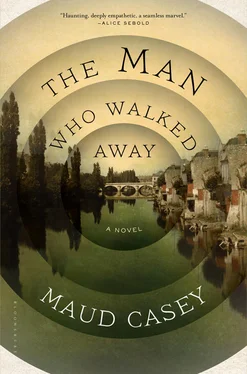“Ga! Ga!” said the father goose. Then the mother goose chimed in, “Ga! Ga! Ga!” And then a third goose. And then a fourth. “Ga! Ga! Ga!” And a fifth. And then the sixth and final goose. “Ga! Ga! Ga! Ga! Ga! Ga!” This was their prayer, and they prayed and prayed and prayed until their prayer was a song.
“When they are done praying,” Albert’s father would say, “the story will end.”
“Why?” Albert always asked, though he had heard the story before and knew what his father’s answer would be.
“Because when they are done praying, the fox will eat them.”
“But instead. .” Albert prompted his father.
“Instead, they pray unceasingly and the story continues.”
“Ga! Ga! Ga!” his father would say to him, instead of good night, keeping the prayer of the story alive. We will always be together, you and I , is what Albert heard. In the flickering light, his father’s face took this shape and then that — a goose, a fox, a king waiting for his son to return home. His father’s face could take any shape it wanted, Albert knew; it could be things that it wasn’t, not only the things that it was.
There is his father about to blow out the gas lamp, the story still shimmering all around them. Ring ( shadow ring ), the sharp, quick sound of love in Albert’s ears.
What time is it? It is time to lie still.
He lies in his bed and time doesn’t pound him into nothing as he listens to the rain wash clean the piss-drenched streets. He listens as a soaking wet horse clop-clops its way along the slick cobblestones. It is beautiful: the sound of something washed clean; the sound of the horse’s efforts as it makes its way from here to there. There is the clanking of the dinner dishes being cleared; Rachel playing Chopin’s C sharp minor prelude, “Not the Funeral March,” she tells Marian, “the ghostly one,” to which Marian responds, “What a relief, a ghost galloping away from death,” before returning to the sweet murmur of Walter. “Good night!” says the Director. “Listen to Nurse Anne. Tomorrow will bring a new day.”
Ga! Ga! Ga! Never mind tomorrow. Albert wants nothing more than to keep this moment — there it went — alive.
It is the time of the year when the sulfurous smell from the gasworks rides the wind up the hill from the river and hangs heavy in the air. Despite the smell, despite the dust his bicycle spins up that sticks to his face, the Doctor is eager to go to work each day. Ever since Albert’s arrival, the Doctor has looked forward to the moment he slides off his bicycle and walks through the iron gates under the gentle arch of the asylum entrance. Every day our traveler, as Nurse Anne has taken to calling him, offers a new detail, a gift — his dear childhood friend Baptiste, the woman he met on the bridge who asked him to marry her, the story his father told him of the ancient magic of gas, that his father was a pipe fitter for the gas company; every day, there he is at meals with his large, funny ears, sitting contentedly between Marian and Walter at meals—“My pet,” Marian calls him, and Walter no longer squeezes him because he believes in his reality completely; every day, Albert’s large sad eyes glisten with gratitude when he sees the Doctor.
Since Albert arrived, only a small corner of the Doctor’s mind has remained tethered to the daily life to which he had grown accustomed — cutting the ends off the mouse-nibbled bread to eat the softer center for his breakfast, waving to the bartender downstairs as he calls out, “Don’t be a stranger,” remaining a stranger. He still spends time with the other patients — walking Walter to the window to remind him the people are not invented each day only to be invented all over again tomorrow, pulling Rachel’s hair from her face and consoling her when she cries over Chopin’s sister walking her brother’s heart to Warsaw, reminding Marian that she has all of her organs even when she tells him he is a know-nothing wretch. Still, the before is fading. A small corner of the Doctor’s mind remains tethered to his daily life before , but here in the after , the rest has been given over to the question of our traveler, his traveler. Someone comes . And you are changed.
This morning, the Doctor must perform his usual navigation as he pedals through the tangle of schoolchildren, government officials, the occasional drunk staggering over from the café in front of the cathedral to collide with a government official. There was a time when officials used to drop the drunks off at the asylum; this was before the Director made it clear that his asylum wasn’t a catchall. The Director has worked hard to distinguish the asylum as a place where people might not be treated as criminals, where they might be treated without the presence of criminals. “This is not a prison,” he would say when people arrived with the drunks, and then he would provide directions to the jail.
The Doctor swerves to avoid the end of a government official’s walking stick as he uses it to nudge a drunk man away before returning to his conversation. “They. Must. Do,” punctuating each word with a tap of his stick against the ground, “Something. About. That. Smell.”
“Aren’t you they ?” the drunk man says, suddenly suspiciously lucid, but the official chooses not to hear him.
The Doctor hopes never to grow so deaf. Click-clickety-click — he delights in the rhythm of the bicycle propelling the great weight of his body. His teeth gritty with dust, there is still pleasure in his system, still system in his pleasure. Despite the sulfurous smell, people are sitting at the outside tables at the café on the corner of the square where just last night the Doctor found himself dining, tempted out of his usual routine of eating at home alone by the thought that sometimes the answer to complicated questions such as Albert’s are to be found in unlikely places. Sitting next to him was a man reading Journey to the Center of the Earth . How would someone who hadn’t read the book, as the Doctor has, have any idea that it involved, say, volcanic tubes? And yet, how alluring, how inviting, that title.
A life exceeds our ability to describe it, he found himself thinking; names alone do not suffice. Hysteria , for example. The word should not be expected to carry the entire life of that fierce girl in the great doctor’s amphitheater on its back — how could it? A name becomes fixed, but the story underneath a name is ever shifting. And still, there is something in a name, akin to the title of a book.
The dignified trees, the hornbeams that line the public square outside the Palace of Justice, shiver in the wind. Hornbeams. Before they were called hornbeams, they were only trees ; before they were trees , before they were given a name, weren’t they still noble, still beautiful, as they sought the sun? They existed though they had no name, but then someone called them trees and their silhouettes grew sharper, and when someone called them hornbeams , their silhouettes grew sharper still. There are lavender bushes between each of the hornbeams; delicate and lovely even before they were called lavender , but then someone called them lavender and the soft outline of their purple spray became visible to men who cannot see things that have no name. For the same reason, the Doctor realizes, Albert’s condition needs a name.
He is almost to the gentle arch of the asylum when the sky thickens with dark clouds and the rain starts to fall. People squeal and scatter, tenting newspapers over their heads, huddling under the umbrellas of those lucky enough to remember theirs during this season of unexpected showers. The Doctor gets off his bicycle, hopping from one cobblestone to the next to avoid the water rushing between them. All around him, rain batters the roofs, its roar an enormous waterfall threatening to drown the city. The answers often lurk in unlikely places and so he turns left instead of right, into the small stone church across from the asylum.
Читать дальше












